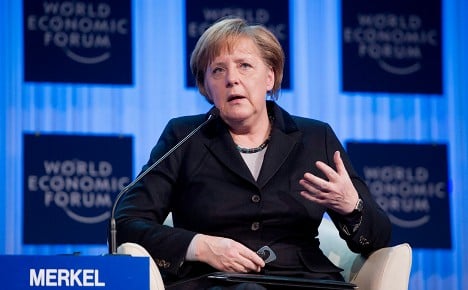As Italy’s new prime minister voiced hope that Germany was willing to take on a greater role in the eurozone crisis, Merkel made clear that Europe’s biggest economy would only go so far to help struggling members of the single currency.
“We have said right from the start that we want to stand up for the euro, but what we don’t want is a situation where we are forced to promise something that we will not be able to fulfill,” Merkel told the annual Davos forum in Switzerland Wednesday evening.
Merkel acknowledged Germany was the continent’s economic powerhouse but said that does not mean it could act at will.
“If Germany, for example, on behalf of all the other member countries, were promising something that – if the markets really attack us we would not be able to come up with – then we have indeed an open flank,” she said.
The annual meeting of the world’s political and business elite began Wednesday amid a deep sense of gloom about the state of the world economy, particularly in the eurozone.
Negotiations to lend Greece more cash to stave off bankruptcy are in a quagmire while efforts to build up a firewall to protect others such as Spain and Italy have met significant obstacles.
EU members and the IMF have called for a boost to bailout rescue funds by merging the temporary European Financial Stability Fund (EFSF) with the permanent European Stability Mechanism (ESM).
While reports emerged that Berlin would agree on condition of stricter discipline from others, it has so far not confirmed such a move.
Ahead of Merkel’s address, IMF chief Christine Lagarde reiterated the call for combined rescue funds, saying that it would represent “a very strong signal of confidence in Europe.”
“If the two together could make a common fund, it would be a very strong signal of confidence in Europe,” Lagarde told Europe 1 radio.
The debate is gaining momentum ahead of a planned decision by EU leaders at a March 1-2 summit, by which time a treaty establishing the permanent fund is due to be signed.
The EFSF still has about €250 billion in its coffers, and it still has a year to run after the entry date for its replacement was brought forward by leaders.
In Rome, Italian Prime Minister Mario Monti said the outline of a solution to Europe’s debt crisis were taking shape thanks to greater willingness by Germany to boost the rescue fund.
“The situation is in evolution … The contours of a possible way out of the grave crisis that has hit Europe are taking shape,” Monti told lawmakers.
But in Davos, Merkel said that there should be enough money to help out the likes of Greece and Portugal but there appeared no way to satisfy the markets.
“We have set up a temporary safety mechanism in the form of the EFSF … so we have the necessary programmes. Portugal, Ireland and Greece can be financed,” she said.
For all of its eurozone partners’ woes, Germany again demonstrated its ability Wednesday to buck the trend by managing to attract long-term funds from investors despite paying a record low interest rate.
In an over-subscribed bond sale, the Bundesbank allotted €2.458 billion at an average yield of 2.62 percent, the lowest ever for a 30-year issue.
Fresh data from Germany also showed that business confidence rose for the third month in a row in January.
Pressure is mounting on Europe to get its house in order as the IMF warned that world economic growth projected to reach 3.3 percent in 2012, could be slashed by more than half if the debt crisis persisted.
The trouble in industrialised Europe is already hurting central and eastern Europe as well as Central Asia, and the World Bank said it would make $27 billion (€20 billion) available to help these states.
Bigger rescue funds may be crucial if talks between private creditors and Greece remain deadlocked, with bankers reluctant to take a loss of more than 50 percent on Greek bonds, which would wipe about €100 billion off the country’s debt.
Adding to the pressure on governments who are trying to get their finances back in order with austerity packages, Europe’s trade unions called for an anti austerity protest across the continent on February 29, the eve of an EU summit.
The European Trade Union Confederation said the aim of the daylong protest was to urge EU leaders to make employment their top priority.
AFP/mdm



 Please whitelist us to continue reading.
Please whitelist us to continue reading.
Member comments